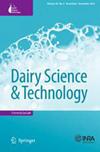Review: The Potential Role of Vitamin E Analogs as Adjunctive Antioxidant Supplements for Transition Cows
Q2 Agricultural and Biological Sciences
引用次数: 0
Abstract
Despite routine supplementation of dairy cattle with vitamins with antioxidant functions, such as α-tocopherol, the high energy demand of the transition period creates a pro-oxidant state that can overcome antioxidant defenses and damage macromolecules. Known as oxidative stress, this condition impairs host immune defenses, predisposing cattle to disease and causing dysfunctional inflammation through a dysregulated production of lipid inflammatory mediators known as oxylipids. Non-α-tocopherol analogs of vitamin E have functions in other species that limit oxidative stress and dysfunctional inflammation but have largely remained unstudied in cattle. As non-α-tocopherol analogs of vitamin E have functions similar to α-tocopherol yet are more rapidly metabolized, they may provide further antioxidative functions with a reduced risk for adverse effects. Indeed, in vitro and in vivo evidence in cattle show a strong safety profile of most non-α-tocopherol analogs, and by several measures, non-α-tocopherol analogs present equally or more potent antioxidative activities than α-tocopherol alone. Further, vitamin E analogs are shown to compete with certain fatty acids for enzymatic metabolism, which may impact proinflammatory mediator production. Given that non-α-tocopherol analogs of vitamin E reduce the production of pro-inflammatory mediators and act as potent antioxidants, their safety and efficacy for these purposes should be further evaluated in cattle.综述:维生素E类似物作为过渡期奶牛辅助抗氧化补充剂的潜在作用
尽管奶牛经常补充具有抗氧化功能的维生素,如α-生育酚,但过渡时期的高能量需求会产生促氧化状态,从而克服抗氧化防御并破坏大分子。这种情况被称为氧化应激,损害了宿主的免疫防御,使牛容易患病,并通过被称为氧脂质的脂质炎症介质的失调产生导致功能失调的炎症。维生素E的非α-生育酚类似物在其他物种中具有限制氧化应激和功能失调炎症的功能,但在牛身上的研究很大程度上尚未得到研究。由于维生素E的非α-生育酚类似物具有与α-生育酚相似的功能,但代谢速度更快,因此它们可能提供进一步的抗氧化功能,同时降低不良反应的风险。事实上,在牛体内和体外的证据表明,大多数非α-生育酚类似物具有很强的安全性,并且通过几种测量,非α-生育酚类似物具有与α-生育酚相同或更强的抗氧化活性。此外,维生素E类似物被证明与某些脂肪酸竞争酶代谢,这可能影响促炎介质的产生。鉴于维生素E的非α-生育酚类似物可以减少促炎介质的产生,并作为有效的抗氧化剂,因此它们在牛体内的安全性和有效性有待进一步评估。
本文章由计算机程序翻译,如有差异,请以英文原文为准。
求助全文
约1分钟内获得全文
求助全文
来源期刊

Dairy Science & Technology
农林科学-食品科技
CiteScore
2.30
自引率
0.00%
发文量
0
审稿时长
2 months
期刊介绍:
Information not localized
 求助内容:
求助内容: 应助结果提醒方式:
应助结果提醒方式:


